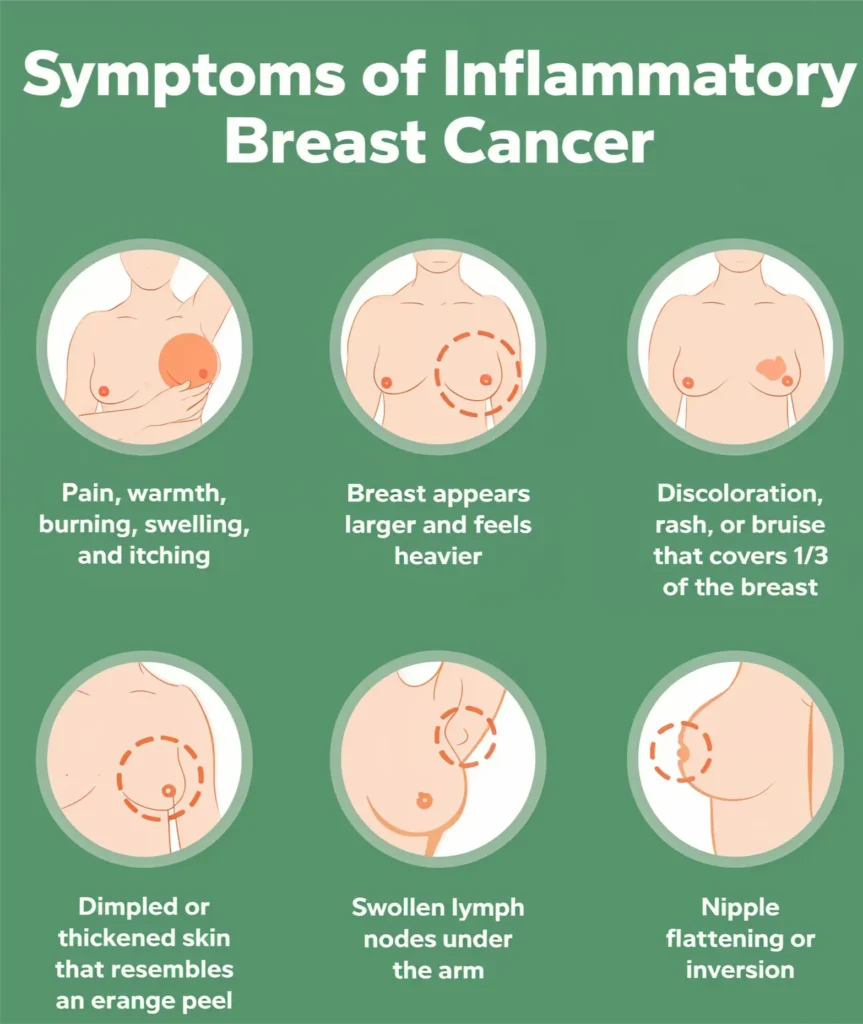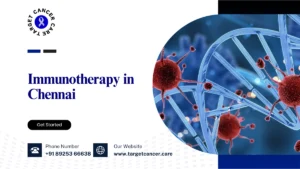Inflammatory breast cancer is a rare but aggressive form of breast cancer. Unlike other breast cancers, it does not form a lump, but instead spreads rapidly within the breast, causing noticeable changes in the skin and underlying tissue. This type of cancer accounts for about 1-5% of all breast cancer cases. Inflammatory breast cancer stages play an important role in understanding the progression of the disease, as it spreads quickly to nearby lymph nodes and other parts of the body. Detecting inflammatory breast cancer early is crucial to effective treatment. In this blog post, we will explore the nature of breast cancer, its symptoms, risk factors, diagnosis, treatment options, and much more.
What is inflammatory breast cancer?
Inflammatory breast cancer is a rare and aggressive type of breast cancer that grows and spreads quickly. It doesn’t usually present with a distinct lump like other forms of breast cancer, but instead, the skin of the breast becomes red, swollen, and warm. This condition results from cancer cells blocking the lymphatic vessels in the skin of the breast. Inflammatory breast cancer is often diagnosed at a later stage due to its rapid growth.
Symptoms
Inflammatory breast cancer symptoms often mimic skin infections or other non-cancerous conditions, which can delay diagnosis. Key signs to watch for include:
- Redness or a flushed appearance of the breast
- Swelling or enlargement in one breast
- Skin texture resembling an orange peel (peau d’orange)
- Breast pain, tenderness, or warmth
- Nipple changes, including inversion or discharge
- Enlarged lymph nodes under the arm or near the collarbone
If you experience any of these symptoms, consult a specialist immediately for an inflammatory breast cancer diagnosis.
Causes
While the exact causes remain unclear, IBC begins when abnormal cells block the lymphatic vessels in the breast skin. Risk factors that may increase the chance of developing this cancer include:
- Genetic mutations (e.g., BRCA1/BRCA2)
- Family history of breast cancer
- Hormonal factors
- Environmental exposures
- Obesity and lifestyle choices
Though rare, understanding the risk factors can lead to early detection and more effective inflammatory breast cancer treatment.

Diagnosis and Tests
Timely and accurate inflammatory breast cancer diagnosis is essential due to the cancer’s aggressive behavior. Diagnostic tests typically include:
- Clinical breast exam
- Mammogram and ultrasound
- MRI scans for detailed breast imaging
- Core needle biopsy of breast tissue
- Skin biopsy if there are visible skin changes
- PET or CT scans to detect metastasis
These tests not only confirm the presence of cancer but also help determine the inflammatory breast cancer stages.
Treatment Options
Because of its aggressiveness, inflammatory breast cancer treatment involves a combination of therapies:
- Chemotherapy (neoadjuvant) to shrink the tumor
- Surgery (usually a mastectomy)
- Radiation therapy to destroy residual cells
- Targeted therapy for HER2-positive cancers
- Hormonal therapy if hormone receptors are present
Treatment plans vary based on the cancer’s stage and biological characteristics. In most cases, a multi-disciplinary approach yields the best outcomes for all inflammatory breast cancer stages.
Possible Complications
Delayed or incomplete treatment of IBC can result in:
- Rapid metastasis to organs such as the lungs, liver, and bones
- Resistance to certain chemotherapy drugs
- Chronic lymphedema
- Emotional and psychological distress
Seeking early inflammatory breast cancer treatment reduces the risk of these complications significantly.
Prevention Tips
While IBC cannot be entirely prevented, you can take proactive measures:
- Perform monthly breast self-exams
- Schedule annual clinical exams and mammograms
- Maintain a balanced diet and healthy weight
- Avoid smoking and limit alcohol intake
- Discuss genetic counseling if you have a family history
Proactive health monitoring improves your chances of early inflammatory breast cancer diagnosis.
Stages of Inflammatory Breast Cancer
IBC is often diagnosed at an advanced stage because of its rapid progression. The main inflammatory breast cancer stages include:
- Stage III: Cancer has spread to nearby lymph nodes and skin
- Stage IV: Cancer has metastasized to distant organs like the liver, lungs, or bones
Knowing the stage helps doctors create a tailored inflammatory breast cancer treatment plan for better outcomes.
Outlook and Prognosis
The prognosis for IBC has improved over recent years due to advances in diagnosis and treatment:
- The 5-year survival rate ranges from 40% to 60%
- Early detection and aggressive treatment improve survival chances
- Emotional support and follow-up care enhance long-term quality of life
Though challenging, many women live meaningful lives after completing inflammatory breast cancer treatment and ongoing care.
Conclusion
It is a rare but aggressive form of cancer that demands immediate medical attention. Early and accurate inflammatory breast cancer diagnosis is essential to initiate timely treatment and improve outcomes. Treatment options, including chemotherapy, surgery, and radiation therapy, play a critical role in managing the condition effectively. Regular checkups and heightened awareness of the symptoms are crucial for early detection. If you or someone you know exhibits signs, consult a healthcare professional without delay. Proper diagnosis and treatment can significantly enhance the quality of life for patients.




